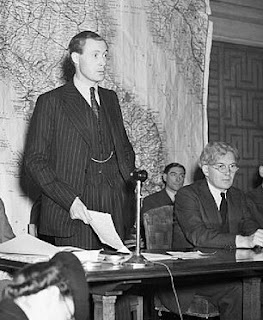Eighty years ago this week German secret weapons embarrass the British government
The first V-2 rocket fell on Chiswick in west London, killing three people. At first the government did not disclose the cause and blamed a gas main explosion. V-2s became nicknamed "flying gas pipes." The news blackout had less to do with security than political embarassment: the day before Duncan Sandys, the minister responsible, had announced that the V-1 campaign had been defeated by overrunning the launch sites and that London's agony was over. Unlike the V-1 the V-2 had sufficient range to hit Britain from Holland still occupied by Germany and there was no means of destroying them in flight. Sandys could take small comfort from being proved right in believing that the Germans had developed rockets whilst Churchill's adviser, Lord Cherwell, had vehemently insisted that this was a scientific impossibility. The argument had centred on the potential weight of warhead, not on the weapon's range.
The second Quebec conference (Octagon) began. It discussed Germany's post-war future. The US Treasury Secretary Henry Morgenthau proposed an aggressive plan under which Germany would be partitioned and all industry in the Ruhr dismantled. President Roosevelt supported this as a way to curry favour with Stalin. Churchill opposed it as he recognised that Germany would have to provide a buffer against the USSR. Lord Cherwell, who was ferociously anti-German, supported Morgenthau, but it was his (entirely correct) argument that Britain would desperately need US financial assistance after the war (the quid pro quo for British support) that overcame Churchill's resistance.
The RAF staged Operation Paravane in which Lancaster bombers of 617 Squadron (the Dambusters) attacked the German battleship Tirpitz in a Norwegian fjord and flew on to Soviet bases before returning to Britain. Tirpitz was damaged but the British were unaware that this was irreparable and that she was downgraded to a floating artillery battery. Fleet Air Arm attacks on Tirpitz a few days before had not achieved anything so Air Marshal Harris of Bomber Command had had the pleasure of knowing that his force had succeeded where the Royal Navy, his bete noire, had failed.



Comments
Post a Comment